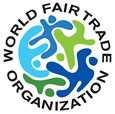Open All
Close All
-
1 . Create Opportunities for Economically Disadvantaged Producers
-
2 . Transparency and Accountability
-
3 . Fair Trading Practices
-
4 . Payment of a Fair Price
-
5 . Ensuring no Child Labor and Forced Labor
-
6 . Commitment to Non-Discrimination, Gender Equality, Freedom of Association
-
7 . Ensuring Good Working Conditions
-
8 . Providing Capacity Building
-
9 . Promoting Fair Trade
-
10 . Climate Action and Protection of the Environment




